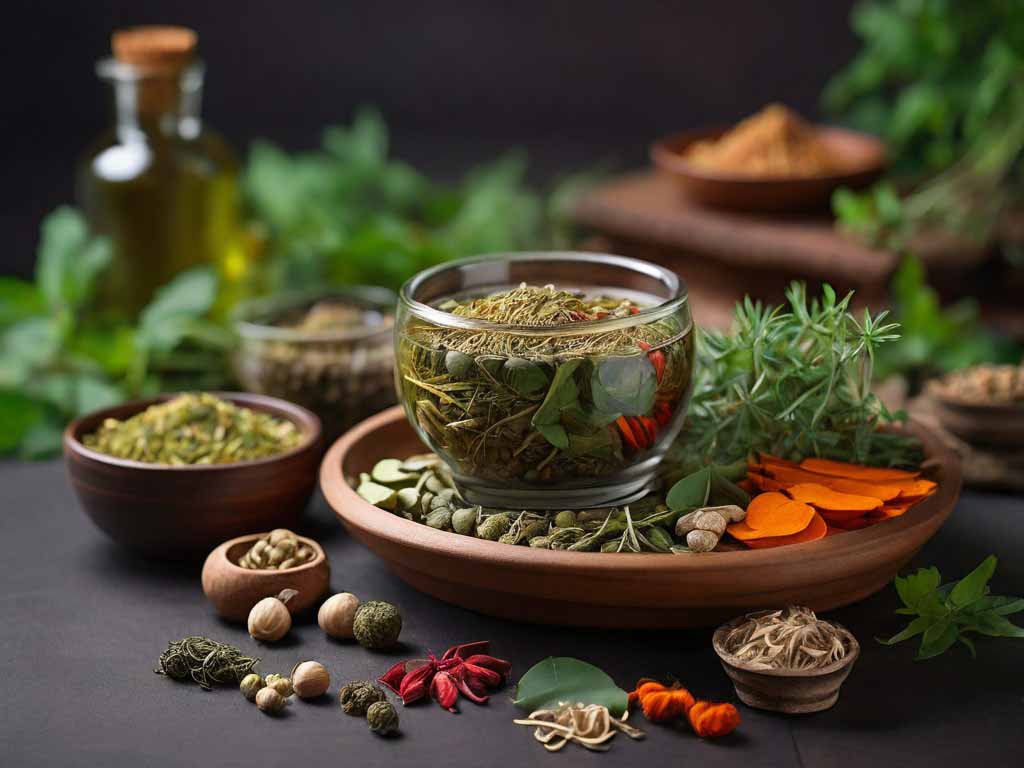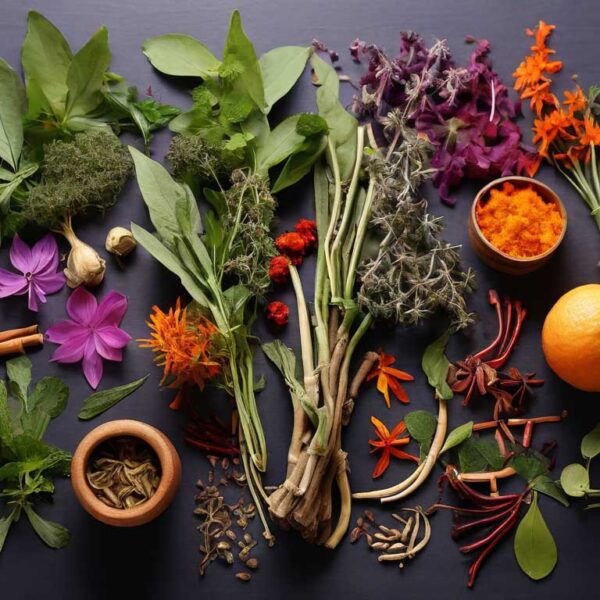
Harmony in Digestion: 5 Ayurvedic Herbs Unveiled for Optimal Gut Health
In the rich tapestry of Ayurveda, digestive health is considered paramount for overall well-being. This comprehensive guide explores the wisdom of Ayurvedic herbs that not only aid digestion but also foster a healthy gut environment. From the perspective of Ayurveda, a well-functioning digestive system is the cornerstone of vitality, and this exploration will delve into the holistic principles and herbal remedies that contribute to digestive harmony.
Understanding Digestion in Ayurveda:
Ayurveda views digestion as a multifaceted process influenced by the doshas—Vata, Pitta, and Kapha. The digestive fire, known as Agni, plays a pivotal role, and imbalances can lead to various health issues. The guide will unravel the Ayurvedic perspective on digestion, Agni, and the importance of maintaining digestive balance with Ayurvedic Herbs .
Triphala: The Tridoshic Cleanser
Triphala, often referred to as “The Tridoshic Cleanser” in Ayurveda, stands as a testament to the profound wisdom encapsulated in the synergy of three fruits – amla, haritaki, and bibhitaki. This herbal combination is renowned for its gentle yet potent detoxifying properties, playing a pivotal role in supporting overall digestive health.
At the heart of Triphala’s efficacy lies its ability to balance all three doshas—Vata, Pitta, and Kapha. Amla, with its rich vitamin C content, supports immune function and enhances digestion. Haritaki, known for its laxative and rejuvenating properties, aids in promoting regular bowel movements and cleansing the digestive tract. Bibhitaki contributes to the removal of excess mucus and toxins from the body, supporting respiratory and gastrointestinal health with these Ayurvedic Herbs.
DIY Recipe: Triphala Detoxifying Tea
Ingredients:
- 1 teaspoon Triphala powder
- 1 cup hot water
- Honey or lemon for taste (optional)
Instructions:
- Mix Triphala powder with hot water in a cup.
- Let it steep for 5-7 minutes.
- Strain the tea to remove any particles.
- Add honey or lemon if desired for flavor.
Consuming Triphala tea regularly promotes gentle detoxification, aiding the body in eliminating accumulated toxins and supporting a healthy digestive system. Its Tridoshic nature makes it suitable for all body types, offering a holistic approach to maintaining digestive harmony and overall well-being. Incorporating Triphala into your routine aligns with Ayurvedic principles, emphasizing the importance of regular detoxification for optimal health with Ayurvedic Herbs.
Ginger: The Warming Ally
Ginger, celebrated as “The Warming Ally” in Ayurveda, stands as a versatile and revered herb known for its exceptional digestive benefits. With its pungent and heating qualities, ginger plays a pivotal role in stimulating Agni, the digestive fire, and fostering overall digestive health.
The warming nature of ginger makes it a potent ally for digestion. It helps to kickstart the digestive process by promoting the secretion of digestive enzymes and enhancing gastric motility. This not only aids in the efficient breakdown of food but also alleviates common digestive discomforts such as bloating and indigestion.
Moreover, ginger’s anti-inflammatory properties contribute to its digestive prowess. It soothes the digestive tract, making it particularly effective in relieving symptoms of gastrointestinal distress. The herb’s ability to reduce inflammation in the gut supports a healthy digestive environment.
DIY Recipe: Ginger Digestive Elixir
Ingredients:
- 1 tablespoon fresh ginger, grated
- 1 tablespoon lemon juice
- 1 teaspoon raw honey
- 1 cup warm water
Instructions:
- Combine grated ginger, lemon juice, and honey in a cup.
- Pour warm water over the mixture and stir well.
- Allow it to steep for a few minutes.
- Strain the elixir and sip slowly.
This Ginger Digestive Elixir serves as a warming and soothing drink that not only enhances digestion but also provides a delightful flavour. Incorporating this DIY remedy into your routine aligns with Ayurvedic principles, promoting digestive fire and ensuring a comfortable and efficient digestive process. Embrace the warmth of ginger for a nourishing and digestive-boosting experience with this Ayurvedic Herbs.
Peppermint: Cooling Digestive Comfort
Peppermint, a versatile herb with a refreshing flavor, is renowned for its exceptional ability to bring cooling relief to the digestive system. Its unique properties make it a valuable ally in alleviating indigestion and fostering a comfortable gut environment.
Peppermint’s main active compound, menthol, plays a pivotal role in soothing the digestive tract. It helps relax the muscles in the gastrointestinal tract, reducing spasms and easing discomfort associated with indigestion. Additionally, peppermint stimulates the production of bile, aiding in the digestion of fats and promoting overall digestive efficiency.
Harnessing the benefits of peppermint for digestive comfort can be easily achieved with a simple DIY recipe: Peppermint Infusion. Begin by boiling water and pouring it over a handful of fresh or dried peppermint leaves. Allow the leaves to steep for 5-10 minutes, depending on your preferred strength. After steeping, strain the leaves, and you’re left with a fragrant and therapeutic peppermint tea. For added flavor, consider incorporating a teaspoon of honey or a slice of lemon.
Incorporating this Ayurvedic Herbs homemade peppermint tea into your routine can provide a natural and soothing remedy for digestive issues. Whether enjoyed after a meal or when discomfort arises, this infusion offers a cooling sensation, contributing to a harmonious and content gut. Embrace the digestive comfort that peppermint provides, and make this simple yet effective DIY peppermint tea a staple in your wellness routine.
Fennel: Nature’s Digestive Elixir
Fennel, often hailed as nature’s digestive elixir, offers a myriad of benefits that contribute to digestive wellness. Beyond its distinct licorice-like flavor that adds a delightful touch to meals, fennel is known for its remarkable ability to alleviate bloating and promote healthy digestion.
The key component in fennel that makes it a digestive powerhouse is anethole, a compound with anti-inflammatory properties. This compound helps relax the muscles of the gastrointestinal tract, facilitating the passage of food and reducing bloating. Additionally, fennel seeds are rich in fiber, which supports regular bowel movements and overall digestive health.
To experience the digestive benefits of fennel, consider a simple DIY recipe: Fennel Infusion. Start by crushing a teaspoon of fennel seeds to release their aromatic oils. Boil water and pour it over the crushed seeds, allowing them to steep for about 10 minutes. Strain the infusion, and you’re left with a fragrant and flavourful fennel tea.
Incorporating this Ayurvedic Herbs fennel infusion into your routine can be a soothing and effective way to support digestion. Enjoy it after a meal to aid in the digestion process or sip it throughout the day to maintain digestive comfort. The natural goodness of fennel not only reduces bloating but also imparts a pleasing taste to the infusion, making it a delightful addition to your wellness regimen. Embrace the digestive elixir that fennel provides, and let its gentle properties contribute to a happier and healthier digestive system.
Ajwain (Carom Seeds): The Carminative Marvel
Ajwain, also known as carom seeds, stands out as a carminative marvel with potent digestive benefits. Widely recognized for its small, oval seeds, Ajwain has been an integral part of traditional medicine for its ability to address common digestive issues, making it a go-to remedy for alleviating gas, bloating, and indigestion while promoting smooth digestion.
The carminative properties of Ajwain are attributed to its essential oil, thymol, which acts as a natural muscle relaxant. This aids in reducing spasms and discomfort in the gastrointestinal tract, allowing for the easy passage of gas and relieving bloating. Additionally, Ajwain stimulates the secretion of gastric juices, enhancing the digestive process and preventing indigestion.
To leverage the carminative marvel of Ajwain, consider a straightforward DIY recipe: Ajwain Infusion. Begin by dry-roasting a teaspoon of Ajwain seeds in a pan until they release a fragrant aroma. Boil water and pour it over the roasted seeds, allowing them to steep for about 15 minutes. Strain the infusion, and you’re left with a warm and flavorful Ajwain tea.
Incorporating this Ayurvedic Herbs Ajwain infusion into your routine can provide relief from digestive discomfort. Sip it after meals to aid digestion or whenever bloating and indigestion arise. The distinct flavour of Ajwain adds a unique and pleasant taste to the infusion, making it both a therapeutic and enjoyable addition to your digestive care regimen. Embrace the carminative marvel of Ajwain and let its natural properties contribute to a harmonious and comfortable digestive system.
Integration of Ayurvedic Lifestyle Practices:
Beyond herbal remedies, Ayurveda emphasizes lifestyle practices for optimal digestion. The guide will touch upon mindful eating, proper food combinations, and daily routines that complement digestive health.
Conclusion:
In the realm of Ayurveda, digestive health is a holistic journey encompassing not only the choice of Ayurvedic Herbs but also lifestyle practices. By unravelling the therapeutic properties of Triphala, ginger, peppermint, fennel, and ajwain, individuals can cultivate a harmonious digestive system and pave the way for enduring well-being.



